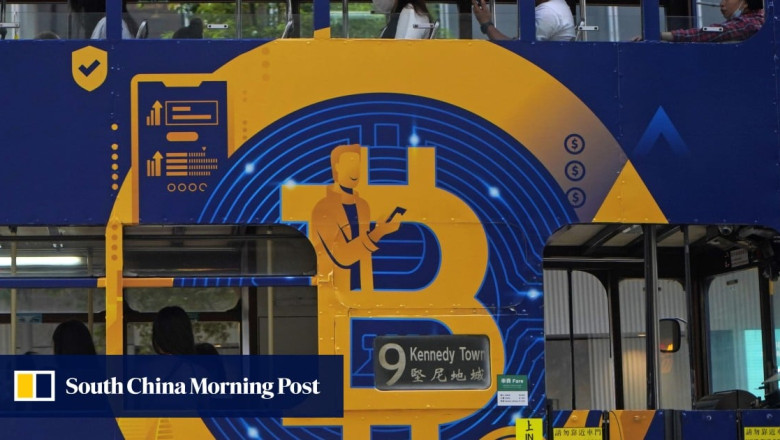
views
 Hong Kong is proposing crypto-related reserve requirements for banks aligned with global standards. Photo: Shutterstock TechPolicyHong Kong among first to propose crypto reserve requirements for banks aligned with new international standards
Hong Kong is proposing crypto-related reserve requirements for banks aligned with global standards. Photo: Shutterstock TechPolicyHong Kong among first to propose crypto reserve requirements for banks aligned with new international standards
- HKMA issues consultation paper on adopting reserve requirements for cryptoassets proposed by the Basel Committee in 2022
- Rules require no changes for tokenised traditional assets at authorised institutions, but tougher requirements for cryptocurrencies like bitcoin
Hong Kong’s de facto central bank has outlined its plans for making the city’s banking institutions among the first to fall in line with international standards for reserve requirements for cryptoassets first proposed in December 2022.
The Hong Kong Monetary Authority (HKMA) issued a consultation paper on Monday explaining how the banking regulator plans to implement standards established more than a year ago by the international Basel Committee on Banking Supervision (BCBS) for governing banks’ crypto holdings.
The standards divide assets that use cryptography and distributed ledger technology (DLT) into four different categories based on risk and other factors that determine how much capital banks must hold in reserve.
The BCBS is a forum where banking and finance authorities from 28 major jurisdictions set standards for prudential regulation. The standards are not legally binding, but are typically adopted through local laws and regulations.
With this consultation paper, Hong Kong has become one of the first major jurisdictions to move towards adopting the Basel crypto standards, according to Andrew Fei, a partner at the law firm King & Wood Mallesons.
“I think this is consistent with the policy from the HKMA and Hong Kong government to really turn Hong Kong into a virtual asset hub,” Fei said, referring to the government’s effort since late 2022 to attract crypto business back to the city.
“I think the significance is that the proposal provides regulatory certainty to Hong Kong banks so that they know under the HKMA capital rules how much they have to set aside for cryptoasset exposure.”
The HKMA proposal aligns closely with the Basel rules, which divides cryptoassets into two broad categories, each with two subgroups.
Group 1 covers tokenised traditional assets (1a) and cryptoassets with effective stabilisation mechanisms (1b). These could be anything from tokenised securities and bonds to stablecoins pegged to a fiat currency. For this group, cryptography is merely a delivery mechanism for traditional assets that already have applicable capital requirements.
Under this proposal, authorised institutions that meet all of the HKMA’s classification requirements can treat tokenised assets basically the same as the non-tokenised versions.
“If you meet all the stringent classification requirements, then you can essentially look through the tokenisation wrapper,” Fei said.
These are the types of assets that large banks are more incentivised to hold, according to Fei. Many of the cryptocurrencies that people are most familiar with, such as bitcoin and ether, would go into group 2, as they have no underlying assets.
More mature cryptoassets with large market capitalisations and greater liquidity belong to group 2a. Under these requirements, assets need to have had a capitalisation of at least HK$78 billion (US$10 billion) and a 10 per cent trimmed mean in daily trading volume of HK$380 million over the previous year.
All other crypto assets go into group 2b, which comes with a capital reserve requirement that can be greater than the value of the assets themselves.
“If you have some lesser known crypto coins, a very bespoke and illiquid cryptoasset, it’s very likely that it will fall into group 2b,” Fei said. “The dollar-for-dollar capital treatment for group 2b crypto assets, I would say, is very conservative and highly stringent.”
The consultation is open to public comment until May 6, and the HKMA plans to implement the rules on or after July 1, 2025.
The paper adds to the HKMA’s efforts to put out rules on the governance of cryptoassets that fall under its purview, which includes stablecoins.
With a slew of new rules and proposals, the Hong Kong government is looking to provide a consistent regulatory framework to give crytpo businesses confidence in the market.




















Comments
0 comment